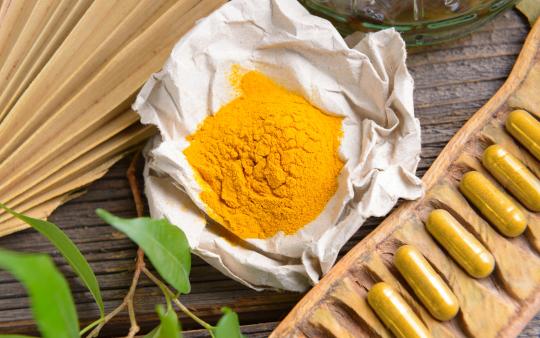Most of us are familiar with turmeric (Curcuma longa) and its power as a “functional food”; you may have even dabbled in golden milks and turmeric lattés as delicious and nutritious ways to up your intake. And while turmeric and curcumin come from the same plant, they are not interchangeable. Curcumin is a compound found in the rhizome of the turmeric plant and is responsible for turmeric’s gorgeous golden-orange hue. Further, the therapeutic benefits of curcumin are much more potent than those of turmeric alone. Get to know this golden antioxidant gladiator!
Upping the "Anti"
While you could certainly just increase your daily intake of turmeric (lattés all around!), only about 3 percent of curcumin is available in the powder. With its purported benefits as an antioxidant and anti-inflammatory powerhouse, a potential anti-cancer agent, and a solid supporter of the cardiovascular and hepatic (liver) systems, a quality curcumin supplement might be the right option for you!
Anti-oxidant
Curcumin’s antioxidant ability works in two ways: by protecting your body from those free radicals that cause oxidative damage (thus speeding up the aging process) and by boosting the activity of your body’s own naturally occurring antioxidant enzymes. Not only does curcumin help stop cell deterioration, it also helps the body protect itself more effectively!
Anti-inflammatory
While our bodies need some inflammation to fight off bad guys and help in healing processes, sometimes inflammation can get out of control. In fact scientists now believe that chronic, low-level inflammation plays a role in everything from arthritis, to diabetes, asthma, inflammatory bowel disease, cancer, and other degenerative disorders. Curcumin has been shown to suppress some of the major mediators of inflammation, including tumour necrosis factor (tnf) which is involved in systemic inflammation, and cyclooxygenase-2 (COX-2), an enzyme that plays a key role in promoting inflammation.
Anti-cancer
Curcumin is becoming more widely accepted in its use for prevention and treatment of cancer. The anti-neoplastic effects of curcumin have been shown to inhibit the growth of transformed cells and all steps of carcinogenesis (the beginning of cancer), including initiation, promotion, and progression. Studies have shown the benefits of curcumin supplementation in the treatment of numerous types of cancer including colorectal, prostate, ovarian, and cervical.
Good for the heart
The cardiovascular protective effects of curcumin are plentiful. Not only does it have cholesterol-lowering effects, it also has the advantage of increasing HDL levels (the good cholesterol). Curcumin also has been shown to inhibit platelet aggregation, decreasing the stickiness of blood cells thus helping to prevent clots. Further, curcumin’s powerful anti-inflammatory action can help reduce the inflammation that contributes to cardiovascular disease.
Love for your liver
Curcumin has shown both antioxidant and anti-inflammatory hepatic-protective effects comparable to that of milk thistle, which is widely used to support the liver. As an active choleretic, curcumin dramatically increases bile acid output, which is essential for healthy digestion and absorption of fats and fat-soluble vitamins, and excretion of bile salt, cholesterol, and bilirubin. Curcumin also increases the solubility of bile which suggests it could provide benefit in the treatment and prevention of gallstones (see below for considerations).
Dosage and safety
The therapeutic dosage of curcumin needed to exhibit a beneficial effect on the body can vary, depending on the form and strength of curcumin, and can be anywhere from 200-400 mg up to three times daily. Look for a supplement that contains black pepper, which helps to optimize absorption, and aim for organic or non-GMO where possible. Supplements with supporting ingredients like ashwagandha and milk thistle are also great to consider.
Curcumin has a very good safety profile and studies have shown that daily doses of up to 12 grams in healthy adults have consistently been well-tolerated with no toxicity (in rare cases some may experience mild stomach upset with dosages over 10 grams per day). Due to its ability to increase bile secretion, it should be used with caution if someone has cholelithiasis (gallstones). Curcumin should not be used in conjunction with certain medications, such as blood thinners and chemotherapy drugs. And at the time of writing, there is not enough data to support the safe use of turmeric during pregnancy. As always, before embarking on a new supplementation programs, please consult your health care professional.






